

ECB's Draghi sees second half euro zone recovery. PRESS RELEASES - Press Release - Speech: The Single Market: Europe's path to growth and jobs. European Commission Michel BARNIER Member of the European Commission, responsible for Internal Market and Services Speech: The Single Market: Europe's path to growth and jobs Conference “Single Market and Growth in 2013” The City of London, 1 February 2013.
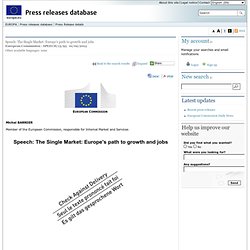
Euro-Zone Data Suggest Stabilization. Www.euro-challenge.org/wordpress/wp-content/uploads/2012/11/February-2013-Newsflash-1-2.pdf. Euro challenge stuff 3234334.docx. Austerity Europe: In depth coverage of government austerity measures aimed at reducing unsustainable budget deficits from the Financial Times. Berlin Plan Hints Future Austerity Measures for Germany. German Finance Minister Wolfgang Schäuble has an inimitable way of misleading his listeners with a torrent of obfuscating words.
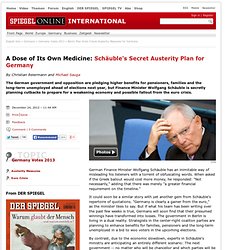
When asked if the Greek bailout would cost more money, he responded: "Not necessarily," adding that there was merely "a greater financial requirement on the timeline. " It could soon be a similar story with yet another gem from Schäuble's repertoire of quotations. "Germany is clearly a gainer from the euro," as the minister likes to say. But if what his team has been writing over the past few weeks is true, Germans will soon find that their presumed winnings have transformed into losses.
The government in Berlin is living in a dual reality. IMF Head Lagarde Warns Germany over Possible Austerity Plan. International Monetary Fund head Christine Lagarde has said that Germany should not be looking at measures aimed at consolidating its finances, apparently in concern over a SPIEGEL report indicating that the German Finance Ministry is working on a far-reaching package of spending cuts and tax hikes for introduction following general elections next autumn.
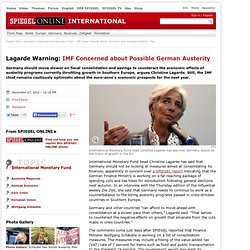
In an interview with the Thursday edition of the influential weekly Die Zeit, she said that Germany needs to continue to work as a counterbalance to the biting austerity programs passed in crisis-stricken countries in Southern Europe. Interview with European Currency Commissioner Olli Rehn on Euro Crisis. Fears of Return of Euro Crisis Plague Central Bankers and IMF. Euro Zone Unemployment Rose to Another Record in January. Panic-driven austerity in the Eurozone and its implications. Southern Eurozone countries have been forced to introduce severe austerity programs since 2011.
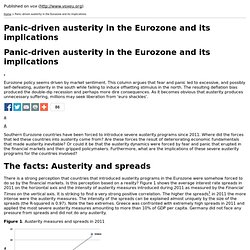
Current State of the EU. Germany: GDP. Germany: Employment Situation. Germany: Industrial Production. Germany: Foreign Trade. Fiscal And Monetary Policy - Germany. Fiscal Policy In 2010, Germany cut 14 million euros in taxes as agreed by the outgoing government coalition of Christian Democrats and Social Democrats.

In 2011, they are aiming to cut 24 million euros in income taxes benefiting in particular low- and middle-income earners as well as families. There are still many details to go into this plan, but regardless Germany's goal is to cut income taxes tremendously. This represents an expansionary fiscal policy as Germany is decreasing taxes. Impacts With expansionary policy comes the goal to close a recessionary gap, decrease unemployment, and stimulate the economy. Is Economics: Encyclonomic WEB*pedia. In general, contractionary fiscal policy works through the two sides of the government's fiscal budget -- spending and taxes.
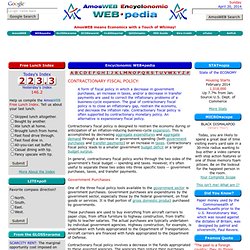
However, it's often useful to separate these two sides into three specific tools -- government purchases, taxes, and transfer payments. Government Purchases These purchases are used to buy everything from aircraft carriers to paper clips, from office furniture to highway construction, from traffic lights to teacher salaries. The actual purchases are typically undertaken by individual government agencies. Expansionary Monetary Policy vs. Contractionary Monetary Policy. Steel, Aluminum, Copper, Stainless, Rare Earth, Metal Prices, Forecasting. Never one to mince his words, veteran investor George Soros called on Germany to change its policies or withdraw from the currency union for the sake of the rest of Europe according to a Telegraph article last week.

Effects of Increasing interest rates Economics Help. The main interest rate is set by the Bank of England.
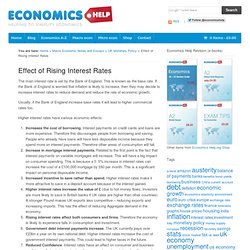
This is known as the base rate. If the Bank of England is worried that inflation is likely to increase, then they may decide to increase interest rates to reduce demand and reduce the rate of economic growth. Usually, if the Bank of England increase base rates it will lead to higher commercial rates too. Higher interest rates have various economic effects: Increases the cost of borrowing. Therefore, higher interest rates will tend to reduce consumer spending and investment. Economy of Germany. Germany is the largest producer of lignite in the world.
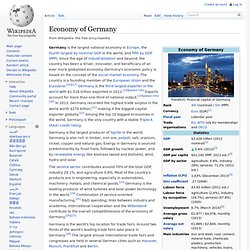
Germany is also rich in timber, iron ore, potash, salt, uranium, nickel, copper and natural gas. Energy in Germany is sourced predominantly by fossil fuels, followed by nuclear power, and by renewable energy like biomass (wood and biofuels), wind, hydro and solar. The service sector contributes around 70% of the total GDP, industry 29.1%, and agriculture 0.9%. Most of the country's products are in engineering, especially in automobiles, machinery, metals, and chemical goods.[23] Germany is the leading producer of wind turbines and solar power technology in the world.[24] Combination of service-oriented manufacturing,[25] R&D spending, links between industry and academia, international cooperation and the Mittelstand contribute to the overall competitiveness of the economy of Germany.[26][27]
Understanding German fiscal policy. It is a common view that governments should run a deficit in bad times, and a surplus or balanced budget — if at all possible — in good times.
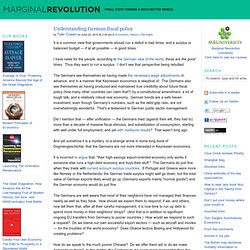
I have news for the people: according to the German view of the world, these are the good times. European Banks Pay ECB Back Early In Sign of Improving Health. In a further sign that the euro crisis is slowly starting to abate, 278 European banks said Friday they would repay the European Central Bank €137 billion ($184 billion) in emergency three-year low cost loans provided just a year ago. Euro Bailout Chief Klaus Regling Upbeat on Prospects for Euro Zone. As Klaus Regling opens up his briefcase inside the convention center at Davos, one could be forgiven for mistaking him for an insurance salesman. He pulls out colorful graphics meant to illustrate the improved competitiveness and budget situations in crisis-stricken European Union member states.
ECB Chief Draghi Clashes With German Finance Minister Over Cyprus. European Central Bank President Mario Draghi confronted German Finance Minister Wolfgang Schäuble last week to criticize his stance on Cyprus and said failure to bail out the island nation could threaten the euro zone. Economist - World News, Politics, Economics, Business & Finance. German Shows Budget Surplus in 2012 Despite Slow Growth. The German economy shrank by 0.5 percent in the fourth quarter of 2012 as a result of the euro crisis which hit exports and investment, preliminary figures released by the Federal Statistical Office on Tuesday showed.
Growth for the full year slowed sharply to 0.7 percent from 3.0 percent in 2011, but that still compares favorably with much of the rest of the euro zone, which remains mired in recession as a result of austerity measures and burgeoning debt. Germany, Europe's largest economy, was able to offset part of the export declines in its core European market with strong growth in exports to the US and big emerging markets like China, hungry for German automobiles and industrial goods. The euro crisis: Not everyone can be Germany. Eurostat Home. Inside Germany’s central bank: Europe’s monetary opposition. Ec.europa.eu/economy_finance/publications/publication6730_en.pdf.
Germany Consumer Confidence.